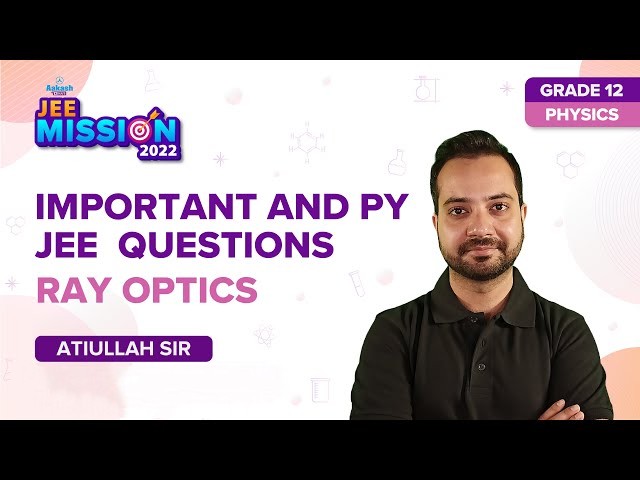Light is the form of energy that enables us to see things around us. The branch of Physics that deals with nature, sources, properties and effects of light is called optics.
Optics is broadly divided into two branches, namely ray optics and wave optics. Ray optics is also known as geometrical optics. Wave optics is also called physical optics. In ray optics, it is assumed that the light travels in a straight line. Ray optics is the study of simple properties of light like refraction and reflection.
Reflection is the phenomenon in which light travelling in one medium, incident on the surface of another returns to the first medium obeying the laws of reflection. Refraction is the phenomenon in which there is a change in the speed of light as it travels from one medium to another and the light rays bend at the surface of separation of the two mediums.
Download Ray Optics Previous Year Solved Questions PDF
JEE Main Previous Year Solved Questions on Ray Optics
Q1: A convex lens is put 10 cm from a light source and it makes a sharp image on a screen, kept 10 cm from the lens. Now a glass block (refractive index 1.5) of 1.5 cm thickness is placed in contact with the light source. To get the sharp image again, the screen is shifted by a distance d. Then d is
(a) 0.55 cm towards the lens
(b) 0
(c) 1.1 cm away from the lens
(d) 0.55 cm away from the lens
Solution
Case I: u = –10 cm, v = 10 cm, f =?
Using lens formula,
(1/f) = [(1/v) – (1/u)]
1/f = [(1/10) – (1/-10)]
f = 5 cm
Case II: Due to introduction of slab, shift in the source is = t[1 – (1/μ)] = 1.5[1 – (⅔)] = 0.5
Now, u = –9.5 cm, v = 10.55 cm d = 10.55 – 10 = 0.55 cm away from the lens.
Answer: (d) 0.55 cm away from the lens
Q2: The speed of light in the medium is
(a) maximum on the axis of the beam
(b) minimum on the axis of the beam
(c) the same everywhere in the beam
(d) directly proportional to the intensity I
Solution
Given μ = μ0 + μ2I
As μ = Speed of light in vacuum/Speed of light in the medium
μ =c/v
v = c/μ = c/(μ0 + μ2I)
As the intensity is maximum on the axis of the beam, therefore v is minimum on the axis of the beam
Answer: (b) minimum on the axis of the beam
Q3: As the beam enters the medium, it will
(a) travel as a cylindrical beam
(b) diverge
(c) converge
(d) diverge near the axis and converge near the periphery
Answer: (c) converge
Q4: The eye can be regarded as a single refracting surface. The radius of curvature of this surface is equal to that of the cornea (7.8 mm). This surface separates two media of refractive indices 1 and 1.34. Calculate the distance from the refracting surface at which a parallel beam of light will come to focus
(a) 4.0 cm
(b) 1 cm
(c) 3.1 cm
(d) 2 cm
Solution
(1.34/v) – (1/∞) = (1.34 – 1)/7.8
1.34/v = 0.34/7.8
v =(1.34 x 7.8)/0.34
v = 30.7 mm ≈ 3.1 cm
Answer: (c) 3.1 cm
Q5: In an interference experiment the ratio of amplitudes of coherent waves is
(a1/a2) = ⅓. The ratio of maximum and minimum intensities of fringes will be
(a) 4
(b) 9
(c) 2
(d) 18
Solution
(Imax/Imin) = (a1 + a2)2/(a1 – a2)2 = (1 + 3)2/(1 – 3)2 = 16/4 = 4
Answer: (a) 4
Q6: The image formed by an objective of a compound microscope is
(a) virtual and diminished
(b) real and diminished
(c) real and enlarged
(d) virtual and enlarged
Answer: (c) The objective of a compound microscope forms a real and enlarged image.
Q7: Calculate the limit of resolution of a telescope objective having a diameter of 200 cm, if it has to detect light of wavelength 500 nm coming from a star.
(a) 610 × 10–9 radian
(b) 152.5 × 10–9 radian
(c) 457.5 × 10–9 radian
(d) 305 × 10–9 radian
Solution
The limit of resolution,
Δθ = 1.22λ/a = (1.22 x 500 x 10-9/200 x 10-2) = 3.05 × 10–7 radian
Δθ = 305 × 10–9 radian
Answer: (d) 305 × 10–9 radian
Q8: A concave mirror for face viewing has a focal length of 0.4 m. The distance at which you hold the mirror from your face in order to see your image upright with a magnification of 5 is
(a) 0.16 m
(b) 1.60 m
(c) 0.32 m
(d) 0.24 m
Solution
Given, f = –0.4 m, m = 5 = (-v/u) = (y/-x) ⇒ y = 5x
(1/f) = (1/v) + (1/u)
⇒ (1/-0.4) = (1/5x) + (1/-x) = 4/-5x
⇒ x = -0.32 m so u = 0.32 m
Answer: (c) 0.32 m
Q9: The value of the numerical aperture of the objective lens of a microscope is 1.25. If the light of wavelength 5000 Å is used, the minimum separation between two points, to be seen as distinct, will be
(a) 0.48 m
(b) 0.12 m
(c) 0.38 m
(d) 0.24 m
Solution
Numerical aperture of the objective lens of microscope = 0.61λ/d
Minimum separation between two points d to be seen clearly,
d = 0.61λ/Numerical aperture
d = (0.61 x 5000 x10-10)/1.25
d = 0.24 m
Answer: (d) 0.24 m
Q10: A convergent doublet of separated lenses, corrected for spherical aberration, has a resultant focal length of 10 cm. The separation between the two lenses is 2 cm. The focal lengths of the component lenses are
(a) 18 cm, 20 cm
(b) 12 cm, 14 cm
(c) 16 cm, 18 cm
(d) 10 cm, 12 cm
Solution
Since the doublet is corrected for the spherical aberration, it satisfies the following condition
f1 – f2 = d = 2 cm
f1 = f2 + 2
Equivalent focal length = F
F = (f1f2)/(f1 + f2 -d) = 10 cm
Solving it, we get
f1 = 20 cm
f2 = 18 cm
Answer: (a) 18 cm, 20 cm
Q11: A single slit of width b is illuminated by coherent monochromatic light of wavelength λ. If the second and fourth minima in the diffraction pattern at a distance 1 m from the slit are at 3 cm and 6 cm, respectively from the central maximum, what is the width of the central maximum? (i.e. the distance between the first minimum on either side of the central maximum)
(a) 6.0 cm
(b) 1.5 cm
(c) 4.5 cm
(d) 3.0 cm
Solution
For single slit diffraction, sin θ = nλ/b
Position of nth minima from central maxima = nλD/b
When n = 2, then x2 = 2λD/b = 0.03 …(1)
When n = 4, then x4 = 4λD/b = 0.06 …(2)
Eqn. (2) – Eqn. (1)
x4 – x2 = (4λD/b) – (2λD/b) = 0.03 or
then width of central maximum = 2λD/b = 2 × (0.03/2) = 0.03 m = 3 cm
Answer: (d) 3.0 cm
Q12: An observer looks at a distant tree of height 10 m with a telescope of the magnifying power of 20. To the observer, the tree appears
(a)10 times taller
(b)10 times nearer
(c) 20 times taller
(d) 20 times nearer
Solution
The telescope resolves and brings the objects closer, which are far away from the telescope. Hence, for a telescope with magnifying power 20, the tree appears 20 times nearer.
Answer: (d) 20 times nearer
Q13: To determine the refractive index of a glass slab using a travelling microscope, the minimum number of readings required are
(a) Two
(b) Four
(c) Three
(d) Five
Answer: (c) Three
Q14: You are asked to design a shaving mirror assuming that a person keeps it 10 cm from his face and views the magnified image of the face at the closest comfortable distance of 25 cm. The radius of curvature of the mirror would then be
(a) 30 cm
(b) 24 cm
(c) 60 cm
(d) –24 cm
Solution
(1/15) + (1/-10) = 1/f
f = -30 cm
R = 2f = 2(-30) = -60 cm
Answer: (c) 60 cm
Q15: A green light is incident from the water to the air-water interface at the critical angle (θ). Select the correct statement.
(a) The entire spectrum of visible light will come out of the water at various angles to the normal
(b) The entire spectrum of visible light will come out of the water at an angle of 90° to the normal
(c) The spectrum of visible light whose frequency is less than that of green light will come out to the air medium
(d) The spectrum of visible light whose frequency is more than that of green light will come out to the air medium
Solution
As, sin θ = 1/μ
Also, the refractive index (μ) of the medium depends on the wavelength of the light.μ is less for the greater wavelength (i.e. lesser frequency).
So, θ will be more for a lesser frequency of light. Hence, the spectrum of visible light whose frequency is less than that of green light will come out to the air medium.
Answer: (c) The spectrum of visible light whose frequency is less than that of green light will come out to the air medium
Also Read:
Ray Optics JEE Advanced Previous Year Questions With Solutions
Ray Optics – Important Topics

Ray Optics – Important Questions


Comments